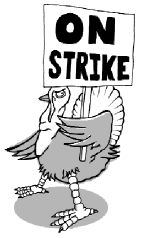The backdrop of chain-link fences and boarded-up windows provided by Seattle Times management didn’t add to the Thanksgiving spirit, but striking Pacific Northwest Newspaper Guild employees seemed content to spend part of Turkey Day on the picket line.
“I’m actually going to have a better Thanksgiving than I would if I was working,” said Times business desk copy editor Frank Russell. “Normally, I’d be here eight hours,” whereas strikers are picketing in four-hour shifts.
Newspaper strikes are traditionally called during the holiday season to gain leverage from the threat of disrupting operations at the busiest and most profitable time of year. The schedule, unfortunately, means dealing with winter weather. “I got the rain this morning when I came down,” said circulation department employee Catherine Bellande. Earlier in the week, she also spent a cold night out at the Times‘ North Creek plant in Bothell, picketing on a 10pm to 2am shift (picket lines are up 24 hours a day). There, members of the Boeing employee unions provided a little relief. “The SPEEA [union] workers brought the burn barrels out for us,” said Bellande. “We’re very grateful for their support.”
Another union high on the thank-you list of strikers is Teamsters Local 174, whose drivers have refused to cross Guild picket lines and have personally joined the pickets at the North Creek facility. “They’ve been huge out there in Bothell the whole time,” said Greg Oberst, an advertising copywriter for the Times.
All the Turkey Day picketers said they’d make it home in time for Thanksgiving dinner. “I’m out here working up an appetite,” reported Oberst.
Strike vet speaks
Retired Times wire editor and copy desk stalwart Hugh Harrison was the most experienced guy on the picket line during the first day of the Seattle newspaper strike.
Harrison was a member of the Guild negotiating committee during the Times strike of 1953, the last time Guild members picketed a Seattle paper. What were the issues then?
“Money—same as now,” says Harrison, who also served as an administrative officer for the Pacific Northwest Newspaper Guild during his long journalism career. He says he’s not surprised to see pickets outside the two newspapers again. “I saw it coming,” notes Harrison. “[Contract negotiations] get harder to deal with each year.”
Asked for a prediction on the duration of the strike, he replied: “I hope it’s a short one. If the company comes to its senses, it will be a short one.”
Budget helps homeless
“I think we ought to think big,” said Seattle City Council member Peter Steinbrueck, touting his proposal to boost homeless services funding by $12 million in the 2001-2002 biennial budget.
There’s nothing like a few weeks of budget hearings to cut big thoughts down to size, but the final city budget package did show some significant changes based on Steinbrueck’s proposals. The council added $1 million for shelter expansion, $1.75 million for new transitional housing, and $750,000 in rental housing assistance over the two-year budget period. That final budget addition, although included in Steinbrueck’s Homeless Strategic Response package, was actually proposed by council member Judy Nicastro. It continues funding for a program that offers one-time rental assistance grants to low-income city residents unable to pay the rent because of emergency or crisis.
“I’m very pleased with the results,” says Steinbrueck. “It’s certainly not what I started out with, but we had to deal with the monorail—and that’s $6 million out of the same pocket.” He’s referring, of course, to the monorail study mandated by city Initiative 53, which will be paid for with $6 million lifted straight out of the general fund.
Lovers of smooth pavement should also take heart. This budget includes more than $10 million in street paving funds for 2001, up from $7.7 million this year.
In other budget news, the council approved a 4.1 percent annual property tax increase. This is more than twice the increase allowed under recently approved state Initiative 722, which the city is challenging in court. Perhaps the council meant this as a show of confidence in their lawyers.
Maria’s fourth-quarter win
Taking a cue from the come-from-behind Washington Huskies, US Senate candidate Maria Cantwell seems to have notched a stunning comeback victory in her run against incumbent Slade Gorton.
Cantwell, who hadn’t led since election night, pulled ahead of Gorton last Thursday and was declared the winner when the vote was certified the following day. But with a required recount scheduled this week, the campaign hasn’t broken out the champagne just yet, as Cantwell told reporters at her “I think I won” press conference last week. (Although as one supporter at that event was spotted presenting an unopened bottle of bubbly to a Cantwell aide, they’re at least prepared.)
The soon-to-be US senator picked up her margin from a decided Democratic trend among the two groups of voters whose ballots were counted last—those who use special ballots (votes cast at a poll other than the one the voter is assigned to) and folks who mailed in absentee ballots late on election night. This, in turn, confirms our long-held suspicions that procrastinators and people who don’t know where they’re supposed to be tend to vote overwhelmingly Democratic.






